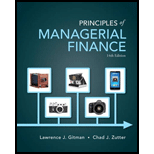
Principles of Managerial Finance (14th Edition) (Pearson Series in Finance)
14th Edition
ISBN: 9780133507690
Author: Lawrence J. Gitman, Chad J. Zutter
Publisher: PEARSON
expand_more
expand_more
format_list_bulleted
Textbook Question
Chapter 5, Problem 5.4STP
Learning Goal 6
ST5-4 Deposits needed to accumulate a future sum Judi Janson wishes to accumulate $8,000 by making equal, end-of-year deposits over the next 5 years. If Judi can earn 7% on her investments, how much must she deposit at the end of each year to meet this goal?
Expert Solution & Answer
Want to see the full answer?
Check out a sample textbook solution
Students have asked these similar questions
file:///C:/Users/rafan/Downloads/Assignment%201%20Paving%20Company%20Case%20S2%202024%20to%202025.pdf
Using the link for the fraud case answer only this question below.
b) As discussed in units 1 to 4, all frauds involve key elements. Identify and describe usingexamples, the elements of Sharp’s fraud.
Option should be match
experts are giving incorrect answer they are using AI /Chatgpt that is generating wrong answer.
i will give unhelpful if answer will not match in option.
dont use AI also
Option should be match.
please don't use ai
if option will not match means answer is incorrect .
Ai giving incorrect answer
Chapter 5 Solutions
Principles of Managerial Finance (14th Edition) (Pearson Series in Finance)
Ch. 5.1 - What is the difference between future value and...Ch. 5.1 - Define and differentiate among the three basic...Ch. 5.2 - Prob. 5.3RQCh. 5.2 - Prob. 5.4RQCh. 5.2 - Prob. 5.5RQCh. 5.2 - Prob. 5.6RQCh. 5.2 - Prob. 5.7RQCh. 5.3 - What is the difference between an ordinary annuity...Ch. 5.3 - What are the most efficient ways to calculate the...Ch. 5.3 - How can the formula for the future value of an...
Ch. 5.3 - Prob. 5.13RQCh. 5.3 - Prob. 5.14RQCh. 5.4 - How do you calculate the future value of a mixed...Ch. 5.5 - What effect does compounding interest more...Ch. 5.5 - Prob. 5.21RQCh. 5.5 - Differentiate between a nominal annual rate and an...Ch. 5.5 - Prob. 1FOECh. 5.6 - Prob. 1FOPCh. 5.6 - How can you determine the size of the equal,...Ch. 5.6 - Prob. 5.27RQCh. 5.6 - How can you determine the unknown number of...Ch. 5 - Learning Goals 2, 5 ST5-1 Future values for...Ch. 5 - Prob. 5.3STPCh. 5 - Learning Goal 6 ST5-4 Deposits needed to...Ch. 5 - Assume that a firm makes a 2,500 deposit into a...Ch. 5 - Prob. 5.2WUECh. 5 - Prob. 5.3WUECh. 5 - Your firm has the option of making an investment...Ch. 5 - Joseph is a friend of yours. He has plenty of...Ch. 5 - Jack and Jill have just had their first child. If...Ch. 5 - Prob. 5.1PCh. 5 - Learning Goal 2 P5-2 Future value calculation...Ch. 5 - Prob. 5.3PCh. 5 - Prob. 5.4PCh. 5 - Prob. 5.5PCh. 5 - Learning Goal 2 P5- 6 Time value As part of your...Ch. 5 - Learning Goal 2 P5-7 Time value you can deposit...Ch. 5 - Learning Goal 2 P5-8 Time value Misty needs to...Ch. 5 - Prob. 5.9PCh. 5 - Prob. 5.10PCh. 5 - Prob. 5.11PCh. 5 - Prob. 5.12PCh. 5 - Prob. 5.13PCh. 5 - Prob. 5.14PCh. 5 - Prob. 5.15PCh. 5 - Prob. 5.16PCh. 5 - Cash flow investment decision Tom Alexander has an...Ch. 5 - Learning Goal 2 P5-18 Calculating deposit needed...Ch. 5 - Future value of an annuity for each case in the...Ch. 5 - Present value of an annuity Consider the following...Ch. 5 - Prob. 5.21PCh. 5 - Learning Goal 3 P5-22 Retirement planning Hal...Ch. 5 - Learning Goal 3 P5-23 Value of a retirement...Ch. 5 - Prob. 5.24PCh. 5 - Learning Goal 2, 3 P5-25 Value of an annuity...Ch. 5 - Prob. 5.26PCh. 5 - Prob. 5.27PCh. 5 - Prob. 5.28PCh. 5 - Prob. 5.29PCh. 5 - Prob. 5.30PCh. 5 - Prob. 5.31PCh. 5 - Prob. 5.32PCh. 5 - Prob. 5.33PCh. 5 - Prob. 5.34PCh. 5 - Prob. 5.35PCh. 5 - Prob. 5.36PCh. 5 - Prob. 5.37PCh. 5 - Prob. 5.38PCh. 5 - Prob. 5.39PCh. 5 - Prob. 5.40PCh. 5 - Learning Goals 3, 5 P5-42 Annuities and...Ch. 5 - Prob. 5.42PCh. 5 - Prob. 5.43PCh. 5 - Prob. 5.44PCh. 5 - Prob. 5.45PCh. 5 - Prob. 5.46PCh. 5 - Prob. 5.47PCh. 5 - Loan amortization schedule Joan Messineo borrowed...Ch. 5 - Prob. 5.49PCh. 5 - Prob. 5.50PCh. 5 - Prob. 5.51PCh. 5 - Prob. 5.52PCh. 5 - Prob. 5.53PCh. 5 - Prob. 5.54PCh. 5 - Prob. 5.55PCh. 5 - Prob. 5.56PCh. 5 - Prob. 5.57PCh. 5 - Number of years needed to acccumulate a future...Ch. 5 - Prob. 5.59PCh. 5 - Prob. 5.60PCh. 5 - Time to repay Installment loan Mia Saito wishes to...Ch. 5 - Prob. 5.62P
Knowledge Booster
Learn more about
Need a deep-dive on the concept behind this application? Look no further. Learn more about this topic, finance and related others by exploring similar questions and additional content below.Similar questions
- Option should be match. please don't use ai if option will not match means answer is incorrect . Ai giving incorrect answerarrow_forwardall frauds involve key elements. Identify and describe usingexamples the elements of fraudarrow_forwardSolve for maturity value, discount period, bank discount, and proceeds. Assume a bank discount rate of 9%. Use the ordinary interest method. (Use Days in a year table.) Note: Do not round intermediate calculations. Round your final answers to the nearest cent. face value(principal) $50000rate interest:11%length of note: 95 days maturity value: ?date of note: june 10date note discounted: July 18discount period:?bank discount:?proceeds:?arrow_forward
- What are the different types of audits and different types of auditors? WHat is an example of each type of audit? What is the significance of each from the perspective of different stakeholders?arrow_forwardDrill Problem 11-5 (Static) [LU 11-2 (1, 2)]Solve for maturity value, discount period, bank discount, and proceeds. Assume a bank discount rate of 9%. Use the ordinary interest method. (Use Days in a year table.) Note: Do not round intermediate calculations. Round your final answers to the nearest cent. face value(principal) $50000rate interest =11% length of note= 95 days maturity value=?date of note=june 10date note discounted= July 18discount period=?bank discount=?proceeds=?arrow_forwardSolve for maturity value, discount period, bank discount, and proceeds. Assume a bank discount rate of 9%. Use the ordinary interest method. (Use Days in a year table.) Note: Do not round intermediate calculations. Round your final answers to the nearest cent.face value(principal) $50000rate interest =11%maturity value=?date of note =june 10date note discounted= July 18discount period=?bank discount=?proceeds=? i need an explanation I am having a lot of trouble to solve thisarrow_forward
- many experts giving wrong solAnswer should be match in options. Many experts are giving incorrect answer they are using AI /Chatgpt that is generating wrong answer. i will give unhelpful if answer will not match in option. dont use AI alsoarrow_forwardAnti-Pandemic Pharma Co. Ltd. reports the following information inits income statement:Sales = $5,250,000;Costs = $2, 173,000;Other expenses = $187,400;Depreciation expense = $79,000;Interest expense= $53,555;Taxes = $76,000;Dividends = $69,000.$136,700 worth of new shares were also issued during the year andlong-term debt worth $65,300 was redeemed.a) Compute the cash flow from assetsb) Compute the net change in working capitalarrow_forwardQuestion 3 Footfall Manufacturing Ltd. reports the following financial information at the end of the current year: Net Sales $100,000 Debtor's turnover ratio (based on 2 net sales) Inventory turnover ratio 1.25 Fixed assets turnover ratio 0.8 Debt to assets ratio 0.6 Net profit margin 5% Gross profit margin 25% Return on investment 2% Use the given information to fill out the templates for income statement and balance sheet given below: Income Statement of Footfall Manufacturing Ltd. for the year ending December 31, 20XX (in $) Sales 100,000 Cost of goods sold Gross profit Other expenses Earnings before tax Tax @50% Earnings after tax Balance Sheet of Footfall Manufacturing Ltd. as at December 31, 20XX (in $) Liabilities Amount Assets Amount Equity Net fixed assets Long term 50,000 Inventory debt Short term debt Debtors Cash TOTAL TOTALarrow_forward
- Toodles Inc. had sales of $1,840,000. Cost of goods sold, administrative and selling expenses, and depreciation expenses were $1,180,000, $185,000 and $365,000 respectively. In addition, the company had an interest expense of $280,000 and a tax rate of 35 percent. (Ignore any tax loss carry-back or carry-forward provisions.) Arrange the financial information for Toodles Inc. in an income statement and compute its OCF? All computations must be done and shown manually. Kindly no spreadsheetcomputations. So that I am able to follow and understand clearly please.arrow_forwardJingle Ltd. and Bell Ltd. belong to the same industry. A snapshot of some of their financial information is given below: Jingle Ltd. Bell Ltd. Current ratio 3.2 1 2 1 Acid-test ratio 1.7 1 1.1 1 Debt Equity ratio 30% 40% Times interest earned 6 5 You are a loans officer and both companies have asked for an equal 2-year loan. i) ii) If you could facilitate only one loan, which company would you refuse? Explain your reasoning briefly If both companies could be facilitated, would you be willing to do so? Explain your argument briefly.arrow_forwardWaterfront Inc. wishes to borrow on a short-term basis withoutreducing its current ratio below 1.25. At present its current assetsand current liabilities are $1,600 and $1,000 respectively. How muchcan Waterfront Inc. borrow?arrow_forward
arrow_back_ios
SEE MORE QUESTIONS
arrow_forward_ios
Recommended textbooks for you
 Financial Accounting: The Impact on Decision Make...AccountingISBN:9781305654174Author:Gary A. Porter, Curtis L. NortonPublisher:Cengage Learning
Financial Accounting: The Impact on Decision Make...AccountingISBN:9781305654174Author:Gary A. Porter, Curtis L. NortonPublisher:Cengage Learning PFIN (with PFIN Online, 1 term (6 months) Printed...FinanceISBN:9781337117005Author:Randall Billingsley, Lawrence J. Gitman, Michael D. JoehnkPublisher:Cengage Learning
PFIN (with PFIN Online, 1 term (6 months) Printed...FinanceISBN:9781337117005Author:Randall Billingsley, Lawrence J. Gitman, Michael D. JoehnkPublisher:Cengage Learning

Financial Accounting: The Impact on Decision Make...
Accounting
ISBN:9781305654174
Author:Gary A. Porter, Curtis L. Norton
Publisher:Cengage Learning

PFIN (with PFIN Online, 1 term (6 months) Printed...
Finance
ISBN:9781337117005
Author:Randall Billingsley, Lawrence J. Gitman, Michael D. Joehnk
Publisher:Cengage Learning
5 Steps to Setting Achievable Financial Goals | Brian Tracy; Author: Brian Tracy;https://www.youtube.com/watch?v=aXDuLxEJqBo;License: Standard Youtube License